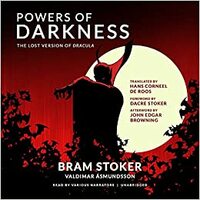Take a photo of a barcode or cover
152 reviews for:
Powers of Darkness: The Lost Version of Dracula
Bram Stoker, John Edgar Browning, Dacre Stoker, Valdimar Ásmundsson
152 reviews for:
Powers of Darkness: The Lost Version of Dracula
Bram Stoker, John Edgar Browning, Dacre Stoker, Valdimar Ásmundsson
Interesting start that definitely fades by the end.
Really cool to read! I liked the footnotes that provided historical/cultural context and excerpts from the traditional version of Dracula.
The actual story itself was pretty good, though the ending is very condensed. It focuses more on Harker's time in the castle than Dracula actually doing much vampire-y stuff. I thought the scene in the tomb (with the large gathering of people) was interesting.
The actual story itself was pretty good, though the ending is very condensed. It focuses more on Harker's time in the castle than Dracula actually doing much vampire-y stuff. I thought the scene in the tomb (with the large gathering of people) was interesting.
As soon as I found out about this not-a-translation of Dracula I knew I had to read it. At the time, I hadn't yet read Dracula so I went and read that and then read this immediately afterwards. And you know what, I'm just going to say it - I think that this is better. That does come with the caveat that as soon as Jonathon Harker leaves Castle Dracula it's obvious that he got bored and the remaining 130,000 words were cut down to only 9,100. But, honestly, I think that the section in the castle is absolutely the best part of the book anyway (as I wrote in my review of Dracula), so he absolutely had it right where the emphasis should be. Dracula is a much better villain in the version - his motivations are clearly fleshed out; he's a Social Darwinist that believes that he & his bloodline are fundamentally superior and should take over the rest of Europe. He feels much more genuinely evil, which is also highlighted through the virgin sacrifice that takes place in the basement. This is actually the kind of stuff that I can see the Edwardians finding too frightening. There's also a bit where Jonathon opens a mysterious trap door and just sees a chute absolutely full of human bones it's really excellent. Even after Jonathon leaves, while obviously it's massively condensed and also somehow has an even more anti-climactic ending than the original Dracula, I really liked some of the different plot elements. Valdimar adds in this theory about souls getting tied to bodies and then acting out their "true natures" which is cool, and it means that Lucy (or Lucia in this) doesn't actually become a vampire but is still undead and her love for Arthur calls out from beyond the grave and is making him ill. It's cool! There's also much more of an understanding, again, of Dracula's plans once he's in London - he's good friends with a lot of people in various positions of power that you see at a dinner party. I also liked the bit where Dr Seward goes mad but maybe that's just because I hate him and I hope he gets a taste of his won medicine. Valdimar also adds in much more romance & sexuality which make the plot more interesting too. For anyone who's a fan of Dracula I would absolutely recommend this, and honestly if you're not it's a good option to read instead because you get most of the plot and it's way shorter and better written.
A WILD ride, terrible pacing, should probably only be ready aloud at parties.
This was a wonderful vampire story. I actually prefer it to the original Dracula story. Well written and a fantastic adventure.
Fun, but ultimately does not hold up
Many of the changes in the text, including extra characters, are fun. But, for me, the changes in format halfway through the book- the switch from the fun presentation in faux journal entries, recording dictations (Dr.S's phonograph), and newspaper quotes- to a general 3rd person just don't do justice to the original. Also, the flow of switching perspectives, balanced in the original rather nicely, makes the journal to typical 3rd person authorial just feel ungainly.
Still, just the situation of no one realizing for decades that this "rogue translation" existed is ridiculously amusing, and I am glad I got to read it.
Many of the changes in the text, including extra characters, are fun. But, for me, the changes in format halfway through the book- the switch from the fun presentation in faux journal entries, recording dictations (Dr.S's phonograph), and newspaper quotes- to a general 3rd person just don't do justice to the original. Also, the flow of switching perspectives, balanced in the original rather nicely, makes the journal to typical 3rd person authorial just feel ungainly.
Still, just the situation of no one realizing for decades that this "rogue translation" existed is ridiculously amusing, and I am glad I got to read it.
Part one is fun, though not really *that* much of a departure from the original to justify a standalone edition in my view, but part two is basically just an outline. I guess the Icelandic translator ran out of steam, or…didn’t know there was a second half?
adventurous
dark
informative
mysterious
The first 70% of the book are a great read, pacy & exciting. Then around the 75% mark this suddenly turns into a really bad google translate jon that is painful to read. No idea why. It’s like they never thought anybody would read to the end.
Icelandic Dracula is... so Icelandic (managed to fit in troll and elf references), more political, but less queer. The first half has a lot of floor plans; the second half is abridged. Overall, an enjoyably strange read.


